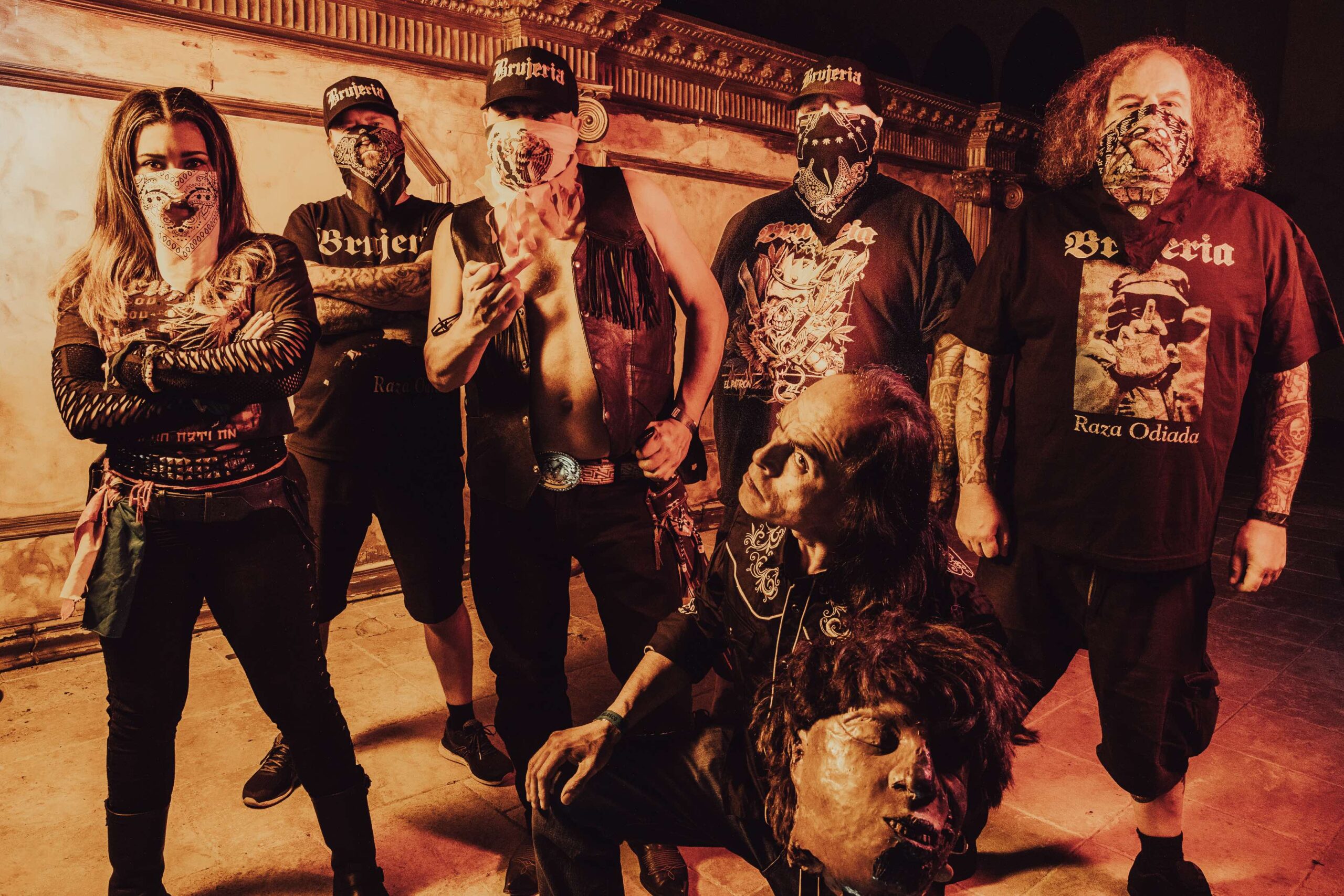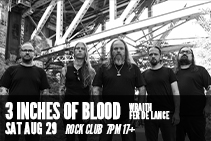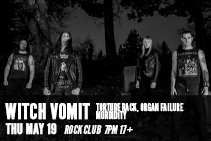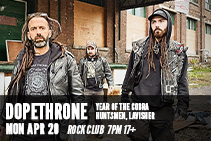

BRUJERIA
Decades before Breaking Bad, Narcos, or Mayans M.C., BRUJERIA put the world of cartels and ritualistic murder on wax with a brutal power equivalent to when Compton arrived in pop culture via NWA.
BRUJERIA emerged, shrouded in mystery and infamy, in 1989. They forcefully introduced phrases like Matando Güeros, La Migra, Marijuana y Brujerizmo into the lexicon of extreme subcultures from hardcore punk to death metal. The brutal death grind band from Mexico came to represent the notoriously violent world of illegal drug trafficking, vicious retaliation, and a sinister syncretism between Afro-Caribbean sorcery like Palo Mayombe and Santeria with outright demonic possession.
They brandish rifles and machetes. Most importantly, they’re armed with an arsenal of brutal riffs. Rumors abound that frontman Juan Brujo ingeniously surrounded himself over the years with members of legendary bands like NAPALM DEATH, CARCASS, and AT THE GATES and performers from beloved TV shows like Orange Is The New Black and Jackass. But nobody knows for certain. That’s because the men and women of BRUJERIA conceal themselves with bandanas, serapes, and balaclavas.
Conjured like a cabal whenever society reaches a new tipping point between order and chaos, Brujeria sacrifices songs to full-length albums and singles, as decidedly apocalyptic as the Mayans, by their own calendar. Records like Raza Odiada (1995) and Brujerizmo (2000) are undeniable classics. Ripping excoriations of daily news like “Amaricon Czar” (2019) and “COVID – 666” (2020) are bitingly topical.
Coco Loco (a metal mascot as iconic to many metalheads as IRON MAIDEN’s Eddie or MEGADETH’s Vic Rattlehead) returns in 2023, emblazoned on a ferocious fifth full-length album dubbed simply Esto Es Brujeria.
BRUJERIA makes the metal version of the corrido, a traditional Mexican song style built on storytelling. The narratives cover everything from history to daily life for outlaws. In Brujeria’s case, the narrator’s tales range from righteous murders of oppressors and rivals to drug deals gone wrong. On Esto Es Brujeria, their blistering new platter, they growl about everything from being Party Boss to a first night in jail.
Brujeria’s 1993 debut, Matando Güeros, was so extreme that record stores and distributors returned copies en masse the moment translators made English versions of the lyrics available. But it was too late to stop BRUJERIA, as word of the devastating riffs and wild tales of drugs, sex, and murder spread. The book Heavy Metal: The Music And Its Culture included it on their 100 Definitive Metal Albums list. One of the songs landed on the soundtrack to Harmony Korine’s controversial drama Gummo.
Two years later, sophomore slab Raza Odiada declared war on then – California governor Pete Wilson (portrayed on the album by DEAD KENNEDYS’ frontman Jello Biafra) and his controversial immigration policies. Drug smuggling and related themes abounded, as well as a song supporting Mexico’s revolutionary Zapatistas. A music video for “La Ley De Plomo” somehow made it (briefly) to MTV.
Melody Maker called 2000’s Brujerizmo “wonderfully demented thrash” and “murderous noise, absolutely bereft of anything approaching accessibility.” CMJ praised Brujo’s “growling political rants,” while NME declared, “They take a hyper-violent idea to its logical, bowel-churning, and comically thrilling end.” The title track remains one of BRUJERIA’s most streamed songs on Spotify.
After a long absence, BRUJERIA returned with Pocho Aztlan in 2016. The band’s first album with Nuclear Blast Records injected fresh blood into the unstoppable crew in the form of new recruits. The songs combined the focused groove of Brujerizmo with the impenetrable death grind of the mid – 90s.
Esto Es Brujeria brings BRUJERIA roaring full circle into the post-pandemic era, with the deep polarization, civil unrest, ongoing brutality, and social upheaval of the day ripe for the band’s notorious critiques. Steeped in dense myth, extreme metal’s most notorious antiheroes materialize anytime, anywhere, to spin their tales of anarchic mayhem and lawless fury . They are eternal banditos, prepared to party.

CATTLE DECAPITATION
You don’t name your band Cattle Decapitation if you’re looking to subtly insinuate your way into the consciousness of the masses. Equally, unleashing some of the most intense, horrifying, and extreme metal known to mankind will not ingratiate you with those of a sensitive nature, for the San Diegan’s boundary-pushing music is designed to turn heads and snap necks, and not necessarily in that order. Returning with their seventh full-length, the devastating Monolith Of Inhumanity, the band have never sounded more focused, more aggressive, or more determined to get in the faces of those who erroneously believe they have already experienced the band at their extreme best. “One of the main things this band has done since the very beginning was to try to break tradition and break the mold of what’s acceptable, in any given genre we’re working in,” states vocalist Travis Ryan. “I’m really happy that with this record we’ve been able to successfully push those boundaries further than we ever have, and without going into the ‘suck’ realm or sounding contrived. We’ve gone so far out on a limb on this one, and I’m just ecstatic that we’ve pulled off what we were trying to achieve.”
This achievement stands as one of the most volatile, ambitious, and impossible to aptly categorize records you will hear in 2012. Dragging their ever-evolving deathgrind sound kicking and screaming into the epic territory inhabited by the likes of Dimmu Borgir and Anaal Nathrakh, the quartet redefine all perceptions of what Cattle Decapitation is. “The mindset of this band has always been abrasive and balls to the wall, and like a car accident where there’s no fucking stopping it. Throwing melodic vocals or guitar work – or dare we say catchy elements – into that is tantalizing,” says Ryan. That such elements have been woven sparingly into their turbulent racket does not mean the band have in any way diminished the sheer visceral impact they are known for. “There can be hooks and catchiness without compromising what the band – or any individual in the band – is all about,” asserts guitarist Josh Elmore. “Having these elements at our disposal is just another tool with which we can build the best songs that we can. It was great also having input from Derek (Engemann, bass, who makes his writing and recording debut with this album), who added some new dynamics to some of the songs. We also spent a lot of time thinking about structure on this record, wanting every moment to count, no matter what the tone of it was.” After one exposure to Monolith Of Inhumanity it’s evident that these more melodic elements truly enhance the power of the tracks, and make for a more diverse and involving collection. On “A Living, Breathing Piece Of Defecating Meat” the band unleash a chorus
that manages to be hideous and infectious at the same time, while the towering “Your Disposal” and “Lifestalker” wield sweeping, dramatic sections tinged with apocalyptic fury, which are all the more gripping for the inclusion of Ryan’s melodic shrieking. “I was waiting for the guys to write parts I could use that kind of melody on, and as soon as they played me “Your Disposal” I dropped the song I was working on and just went for it,” enthuses Ryan. “This is the first record where I really listened to what the fans were saying they wanted, and many of them wanted a lot more of those weird, epic, melodic parts that crept into The Harvest Floor (2009), and I’m like okay, done, because luckily I agree with you this time!”
As with all of the band’s releases, Monolith Of Inhumanity revolves around a central concept, building upon Ryan’s potent distaste for contemporary civilization and the damage wrought in the name of progress. “Whereas The Harvest Floor focused on sort of rounding up the populace and getting rid of them, this record is about what would happen had we let them go. It’s about where humanity will end up if it continues the course it’s on,” the vocalist explains. This concept, inspired in part by 2001: A Space Odyssey, is once again captured in the cover art by longtime collaborator Wes Benscoter, depicting a bleak apocalyptic future and the regression of mankind into apes. “The monolith really represents technology, and the cover’s this trash heap with the monolith atop it and humans scavenging all around it, because that’s all they’re able to do any more. It’s where we’re headed on the course we’re on, and yeah, a lot of kids will say that’s a really negative, shitty attitude to have, but is it not correct?”
In realizing the record, the quartet – rounded out by drummer Dave McGraw – travelled to Denver, Colorado to collaborate with producer Dave Otero (Allegaeon, Cephalic Carnage). “Dave brought really good performances out of everybody, and he gave the record a lot of clarity while the heaviness is still there,” states Elmore, though it was the producer’s suggestions on how to better flesh out the songs that made the most profound difference in the guitarist’s eyes. “The guy really knows what he’s doing. I do a lot of layering after the basic rhythm track, and if I came to a point where I wasn’t sure about something someone would always pipe up and say you realize everything Dave has suggested so far has worked? Try it!” he laughs. That the record is as accomplished as it is also belies the fact that the schedules of the members made it difficult for them to focus on writing it over the year they had allotted. “As it turns out we work really well under pressure,” Ryan says with a wry smile. “But we were all so busy it’s literally a wonder that we got it done at all in that year, let alone what we came out with. It makes me feel like we’re capable of anything, and that’s really a new development.”
The visual aspect of their output having always been important to them, the band are enthused to have the album released as a gatefold vinyl, and to have Tom Bunk, creator of The Garbage Pail Kids collectors cards from the 1980s, design cards for the individual members of the band, which will be available with pre-orders. “Collecting those cards was one of my favorite things when I was a kid, and our friend and ex-manager is a complete nerd about it and has known Tom Bunk for years, and put us in touch with him. This is an older guy that doesn’t have to be fucking around with some deathgrind band who isn’t going to push him to new heights, but he thought it sounded like a fun project and he was very cool about everything. It still hasn’t really hit me that we quite literally have our own Garbage Pail Kid cards!” Ryan grins. “The funny thing is that it also inadvertently ties right into the theme of the record, which has so much focus on garbage and waste. It didn’t even occur to me until months later, but that’s the beauty of this band, things happen for a reason. For instance, for the first time, going into this record I didn’t have the whole concept worked out in my head. Usually I have it in mind as much as a few years before we get around to making the record, and I need that, it has to make sense to me or it’s just not going to work. I was so scared it just wasn’t going to come, but one day it literally just hit me. The title, the concept, the cover, all of it, and suddenly everything fell into place, and now it’s done I think this is the first time we’ve all been one hundred percent proud of what we’ve created – and for good reason.”
Bio by Dan Slessor

PIÑATA PROTEST
Punk rock like abuela used to make!
Piñata Protest is a “Tex-Mex punk” band from San Antonio, TX. Their self described sound and attitude arises from the two counter-clashing worlds that the band embraces: punk and Tex-Mex.
Piñata Protest’s unique and catchy sound takes the traditional folk rhythms of Tex-Mex music (conjunto and norteño music that is native to the South-Texas and Nortern-Mexican region they originate from) along with the three-row button accordion and combine that with the fast tempos and attitude of punk rock, ska, and many other genres. Along with the use of traditional instruments and rhythms the band also sings in their regional mix of Spanish and English (or Spanglishas it’s called locally). Their songs lyrics cover a range of topics, from political topics close to the ethno-identities of the band, drinking, love, religion, and racism. Adding to their sonic performances is a lively and energetic live show that ignites crowds to mosh, skank, and twirl their dance partners.
Piñata Protest was founded by the Mexican-born singer, song writer, and accordionist Álvaro Del Norte. The band includes Regino Lopez on electric guitar and vocals, Richie Brown on electric bass and vocals, and Chris-Ruptive on drums. Other instruments such as the trumpet and güido are used in not only their studio recordings but their live performances as well.
For over ten years the quartet has maintained a busy schedule of performing and touring throughout the United States, Canada, Mexico, Spain, and France alongside range of musical acts such as The Reverend Horton Heat, Mariachi El Bronx, Molotov, GBH, Tagada Jones, Guttermouth, Voodoo Glow Skills, Brujeria, The Toadies, Ramon Ayala, The Blasters, Authority Zero, Agent Orange, Ozomatli, Mustard Plug, The Blasters, and Wayne Hancock.
Festivals are a strong point for Piñata Protest. Their very eclectic sound, interactive show, and energetic performances makes them a perfect fit for a wide variety of festivals. Most notably the band has had several official appearances at Punk Rock Bowling, SXSW, The Tejano Fan Fair, Flogging Molly’s Salty Dog Cruise, Palomino Fest, Punk In Drublic, The Latin BMI Awards, Accordion Noir, Muddy Roots Festival, and a slew punk, folk, and Mexican themed festivals.
The bands unique sound has also leaded them to be featured in soundtracks for the following major and independently release films: Tequila Re-Pasado (2023), Me Estas Matando Susana (2016), La Soldera (2015), Circus of the Dead (2014). The band has also written music specially for Me Estas Matando Susana.
The band has also had several collaborations with companies including releasing their own beer through Freetail Brewing with a released of Piñata Protest beer which was distributed in grocery chains, bars, and venues across Texas. The band has also collaborated with other worldwide brands such as Tecate beer, Ford Motor Company, and Nike Athletics.
















